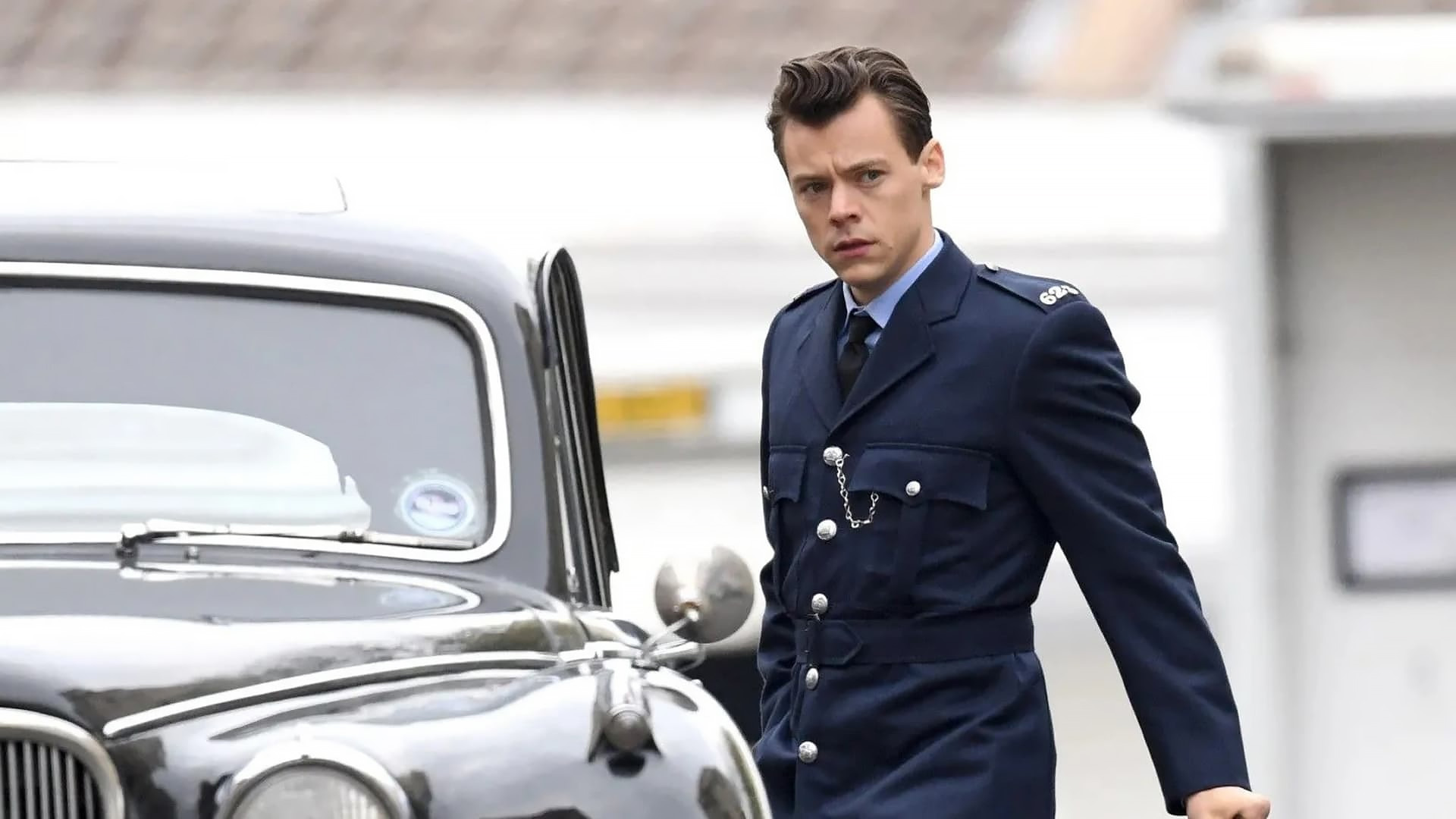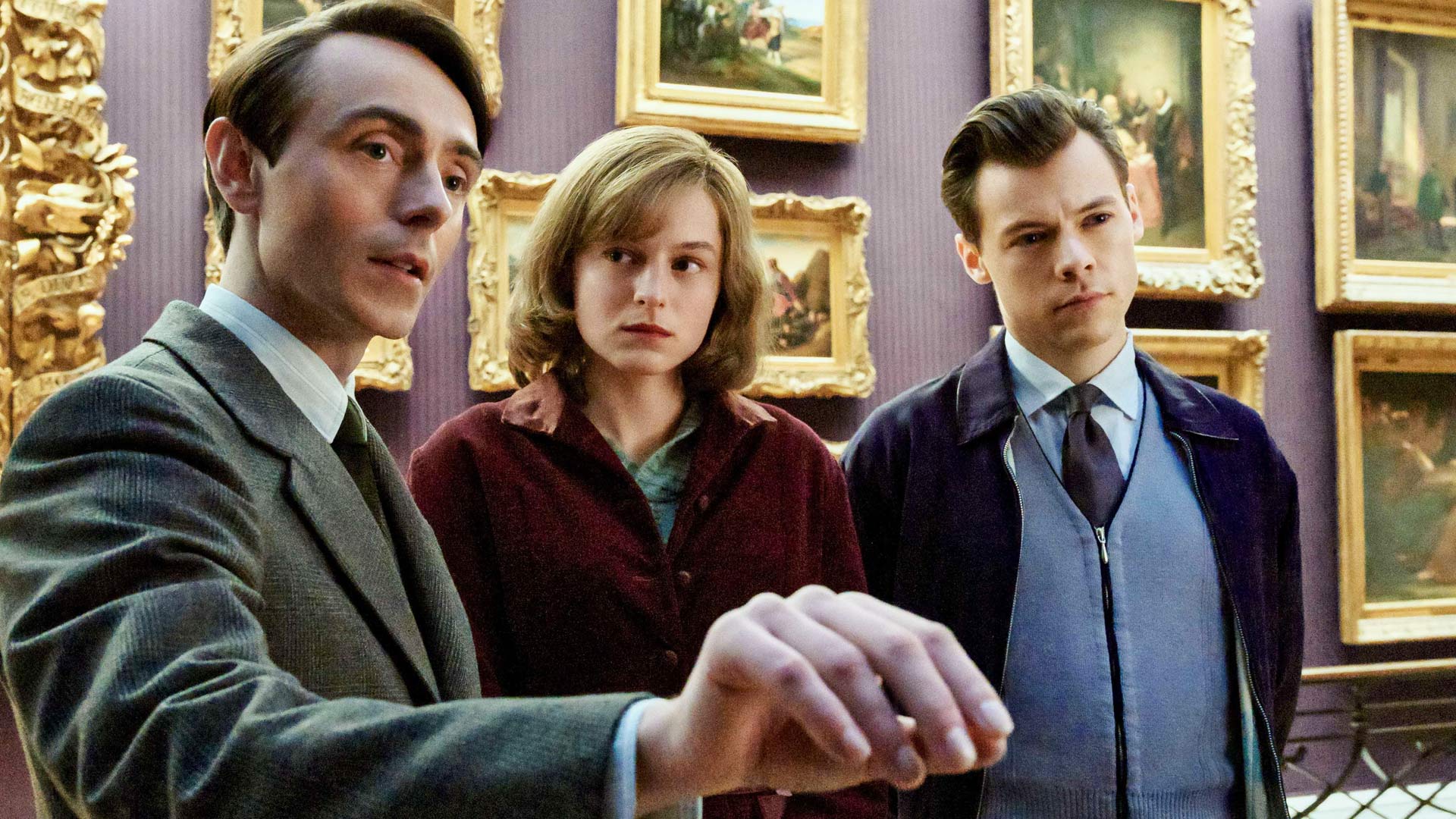Harry Styles is back in My Policeman – but this film won’t convince you that he can act

The jury of public opinion has already decided that Harry Styles is a bad actor. Rory Doherty thinks we’re jumping the gun—but concedes that Styles’ new film isn’t likely to change minds.
The internet is famous for moving through whole discourses at an irregularly quick pace. But even considering that, it’s taken a remarkably short amount of time to decide that Harry Styles is a bad actor. Granted, his My Policeman co-stars Emma Corrin and David Dawson are acting circles around him, and as two queer actors with much less fame than Styles, likely had to work a lot harder to share his limelight as supporting leads.
But My Policeman—a time-jumping reflection on a fractured queer love triangle in 50s Britain when homosexuality was illegal—is only Styles’ third film role (excluding Marvel post-credit scenes). And as there’s no doubt of his inordinate talent in other areas, it’s probably worth waiting until a few films down the line to make a confident assessment of his acting capabilities.
As it stands, Styles isn’t very good in My Policeman. Much of this isn’t his fault; it’s a difficult role and the script doesn’t do him any favours. Yet My Policeman lives and dies on the viewer buying into the turbulent interiorities of three characters, as well as understanding of how they respond to one another. And there’s a clear weak link in Styles. The film would be more forgivable if he were the only issue, but in adapting Bethan Roberts’ novel, screenwriter Ron Nyswaner and director Michael Grandage truncate the emotional story, telling it in a way that’s a far cry from incompetent—but leaves no lasting mark.
After meeting the gaze of Tom (Styles), a young policeman she was familiar with as a child, Marion (Corrin) grows fonder of him as they walk the inevitable path to a plain, 50s English marriage, despite becoming increasingly wary of their older friend Patrick (Dawson) and the past he shares with Tom. In the present-day, an older Marion (Gina McKee) and Tom (Linus Roache) each struggle with repression and guilt as Marion takes care of Patrick (Rupert Everett) after a debilitating stroke, and the scars of their shared history threaten to break open again.
It’s not the most complexly structured drama, but My Policeman’s choice to flit forward to the present-day on top of doubling back in the 50s story to fill in Tom’s past with Patrick makes the narrative feel clumsy. A lot of pressure is put on the actors to carry the splintered storylines, and while Corrin and especially Dawson effortlessly bring to life characters forced to hide so many of their feelings, the connective tissue between their characters is still Tom. Casting Styles is certainly not a bad idea—it makes sense to cast a newcomer for a character who feels out of place in both straight-performing and queer worlds—but he can’t sell the performative layers needed for Tom’s arc. He’s the character who experiences the most change, with the least ability to articulate it.

While Grandage’s direction has produced mismatched performances and a choppy story, My Policeman sings best in its sensual moments. Often the camera lingers on fingers touching bare skin, illustrating how moments of intimacy imprint themselves on one’s memory, lasting longer than the moment of contact. This is present even in the present-day segments, where, despite some clumsy editing, the cuts between older Marion bathing Patrick and young Marion’s hands tracing the stone pillars and engravings of a monument hammer home how important the senses are in such an emotionally suffocating era.
Styles, a performer with incredible physicality, perhaps shines best in moments of intimacy, readily portraying Tom’s hesitation and eagerness at having sex with someone who truly excites him. After filling Patrick and Tom’s sex scenes with grace notes of passion and sensuality, it’s an obvious choice to direct Tom and Marion’s relationship with stilted awkwardness, effective illustrating Marion’s insecurities about the two men’s love.
But if they’re not stealing touches and private moments, these characters talk and argue, the wooden dialogue deflating their charged dynamics and leaving everything reeking of manipulative melodrama. It’s not helped by a last-minute reveal that immediately retracts any sympathy felt towards one of the main three, making it perplexing why My Policeman didn’t shift its focus on the person who has suffered leagues more than our point-of-view character.
After a tender communion is played for the same catharsis as someone who has done something horrible but still enjoys liberation, My Policeman is likely to leave a sour taste in your mouth. It’s not a trainwreck, but too many people involved didn’t do enough to make the film worth your time.


















